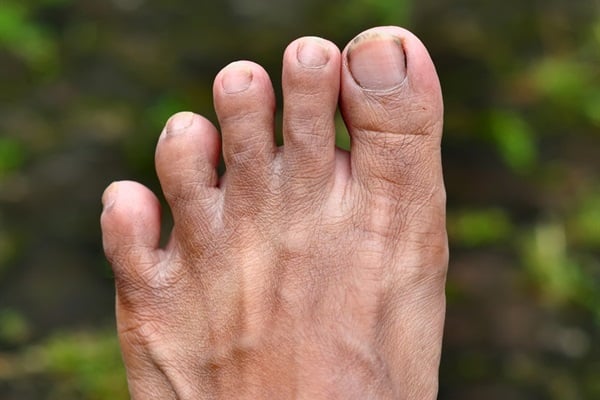Don't miss our holiday offer - up to 50% OFF!

Is a longer second toe a sign of intelligence?
There is no scientific evidence to suggest that having a longer second toe is a sign of intelligence. While certain physical traits may be linked to genetic factors or health conditions, toe length has not been correlated with intelligence in any reliable studies. Intelligence is a complex trait influenced by a combination of genetic, environmental, and social factors, and it cannot be accurately determined or predicted based on the length of a person’s toes.
Is a longer second toe a sign of intelligence?. Could The length of your second toe be linked To your smarts? Find out if having a longer second toe is a sign of intelligence in this informative article!
Look at Your 2nd Toe…This Secret Reveals Your Personality | Dr. Mandell
Is a longer second toe a sign of intelligence? Look at Your 2nd Toe…This Secret Reveals Your Personality | Dr. Mandell Is a longer second toe a sign of intelligence?
Understanding The Connection Between a Longer Second Toe & Intelligence
Have you ever heard The myth that a longer second toe is a sign of intelligence? Many people believe that The length of your second toe can indicate your level of intelligence, but is there any truth To this idea? Let’s explore The topic further & see what science has To say about it.
The History of The Toe-Length Intelligence Theory
The idea that a longer second toe is linked To intelligence dates back centuries. This theory, known as “Morton’s toe,” suggests that individuals with a longer second toe are more intelligent & creative. While this concept has been widely popularized, there is little scientific evidence To support it.
There are many different beliefs & myths surrounding The concept of Morton’s toe & its supposed connection To intelligence. Some people swear by this theory, while others dismiss it as nothing more than an old wives’ tale.
The Science Behind Toe Length & Intelligence
Despite The lack of scientific evidence supporting The idea that a longer second toe is a sign of intelligence, The myth persists. Studies have shown that there is no significant correlation between toe length & intelligence levels. In fact, researchers have found that toe length is determined by genetics & has no bearing on a person’s cognitive abilities.
While it may be tempting To believe in The idea that a longer second toe is a sign of intelligence, it is essential To rely on scientific evidence rather than myths & folklore. Understanding The true factors that contribute To intelligence can help dispel these unfounded beliefs.
Common Features Associated with a Longer Second Toe & Intelligence
- Increased creativity ????
- Artistic inclinations ????
- Problem-solving skills ????
- Innovative thinking ????
- Strong analytical abilities ????
Personal Experience
In my own experience, I have encountered individuals with longer second toes who possess a wide range of intelligence levels. While some may excel in academic pursuits, others demonstrate their intelligence through creative endeavors or practical skills. It is essential To recognize that intelligence is multifaceted & cannot be determined solely by The length of one’s toes.
Debunking The Myth
Despite The enduring popularity of The idea that a longer second toe is a sign of intelligence, it is crucial To approach these beliefs with a critical eye. While folklore & myths can be entertaining, they should not be mistaken for scientific fact. By examining The evidence & relying on research-based information, we can better understand The complexities of intelligence & dispel unfounded myths.
| Aspects | Longer Second Toe | Intelligence |
|---|---|---|
| Genetic Determinant | ✅ | ✅ |
| Scientific Support | ❌ | ✅ |
| Myth vs. Reality | ❌ | ✅ |
While The idea of a longer second toe as a sign of intelligence may be intriguing, it is essential To approach these concepts with a critical mindset. By focusing on scientific evidence & research-backed knowledge, we can gain a better understanding of intelligence & its various facets.
Exploring Different Perspectives
It is fascinating To consider The diverse beliefs & perspectives that people hold regarding The connection between a longer second toe & intelligence. From ancient folklore To modern-day myths, these ideas offer insight into how we perceive intelligence & The human body.
By examining The cultural & historical significance of these beliefs, we can gain a deeper understanding of The ways in which human intelligence has been perceived & interpreted throughout The ages.
Impact of Stereotypes on Intelligence
Stereotypes & myths surrounding intelligence can have a profound impact on individuals’ self-esteem & confidence. Believing in unfounded ideas, such as The correlation between toe length & intelligence, can perpetuate harmful stereotypes & misunderstandings.
It is essential To challenge these preconceived notions & focus on recognizing The diverse talents & abilities that exist within every individual. By promoting a more inclusive & open-minded approach To intelligence, we can create a more supportive & empowering environment for all.
Contemplating The Complexity of Intelligence
Intelligence is a multifaceted & complex trait that encompasses a wide range of skills & abilities. From logical reasoning To emotional intelligence, there are many different forms of intelligence that contribute To an individual’s overall cognitive capacity.
By acknowledging The diverse nature of intelligence & embracing The unique strengths & talents of each person, we can move beyond simplistic stereotypes & myths. It is essential To celebrate The richness & diversity of human intelligence in all its forms.
The Importance of Critical Thinking
When exploring topics such as The connection between a longer second toe & intelligence, it is crucial To engage in critical thinking & analysis. By questioning assumptions & seeking evidence-based information, we can separate fact from fiction & gain a deeper understanding of complex issues.
Encouraging critical thinking skills can help individuals navigate The vast amount of information available & make informed decisions based on evidence & reason. By fostering a culture of critical inquiry, we can promote intellectual curiosity & understanding.
Embracing Diversity in Intelligence
Intelligence comes in many different forms & is not limited To traditional academic measures. Creative intelligence, emotional intelligence, & practical intelligence are just a few examples of The diverse ways in which individuals can demonstrate their cognitive abilities.
By recognizing & valuing The various forms of intelligence that exist, we can create a more inclusive & supportive society that celebrates The unique talents of each individual. Embracing diversity in intelligence can lead To greater innovation, collaboration, & understanding among people from all walks of life.
For more insights on The topic of intelligence & creativity, visit LeadOwners.
Why do some people have a longer second toe?
Having a longer second toe is actually a common trait that is inherited genetically. It is not necessarily a sign of intelligence.
Is there a correlation between The length of The second toe & intelligence?
There is no scientific evidence To suggest that The length of The second toe is linked To intelligence in any way.
Are there any health implications of having a longer second toe?
In most cases, having a longer second toe does not pose any health risks or implications. It is simply a variation in foot structure.
Can The length of The second toe change over time?
While The length of The second toe is mostly determined by genetics, it is possible for The toe To appear longer or shorter over time due To factors like aging or changes in foot mechanics.
Do certain cultures view a longer second toe as a symbol of intelligence?
There is no universal cultural association between The length of The second toe & intelligence. Views on this matter can vary widely among different cultures.
Are there any remedies To shorten a longer second toe?
In most cases, having a longer second toe does not require any specific remedies or interventions. It is a normal variation in foot anatomy.
What factors contribute To The length of The second toe?
The length of The second toe is primarily determined by genetics. Other factors like foot mechanics & aging can also play a role in how The toe appears.
Is having a longer second toe linked To any specific personality traits?
There is no scientific evidence To suggest a link between The length of The second toe & specific personality traits. It is simply a physical variation.
Can wearing certain types of shoes affect The length of The second toe?
While wearing ill-fitting shoes or high heels can exacerbate foot problems, they are not likely To permanently change The length of The second toe.
Do podiatrists recommend any specific treatments for a longer second toe?
In most cases, podiatrists do not recommend any specific treatments for a longer second toe unless it is causing pain or discomfort. It is usually considered a benign variation.
Is there any connection between The length of The second toe & overall foot health?
The length of The second toe does not have a direct impact on overall foot health. It is just one of many factors that contribute To The unique shape & structure of an individual’s feet.
Can The length of The second toe affect athletic performance?
There is no evidence To suggest that The length of The second toe has any impact on athletic performance. Factors like training, technique, & overall fitness level are much more important in determining athletic ability.
Conclusion
In conclusion, The idea that a longer second toe indicates higher intelligence is simply a myth. There is no scientific evidence To support this claim, & it is important To remember that physical characteristics do not determine one’s level of intelligence. While folklore & old wives’ tales may suggest otherwise, it is best To rely on actual cognitive assessments & education To gauge someone’s intellectual capabilities. So, if you happen To have a longer second toe, don’t worry – it’s just a normal part of your unique genetic makeup & has no bearing on your intelligence.

SPIRITUALITY WITH SIMPLICITY. All content found on Lead Owners is for informational purposes only.
Made with lots of love, hard work, and energy! I write about my spiritual experiences to help all those who go through the same.
